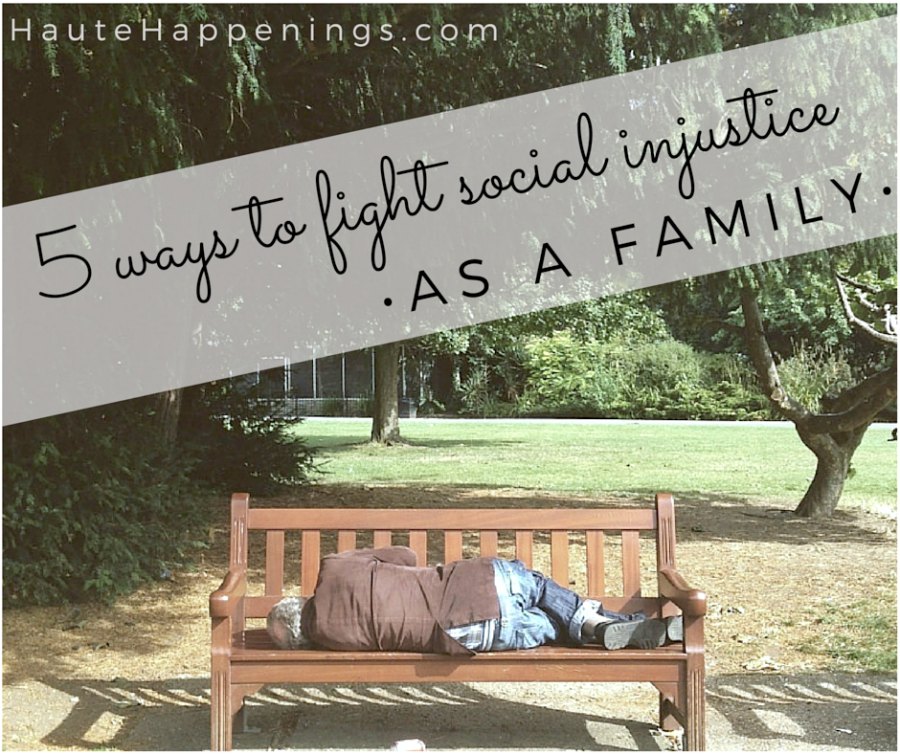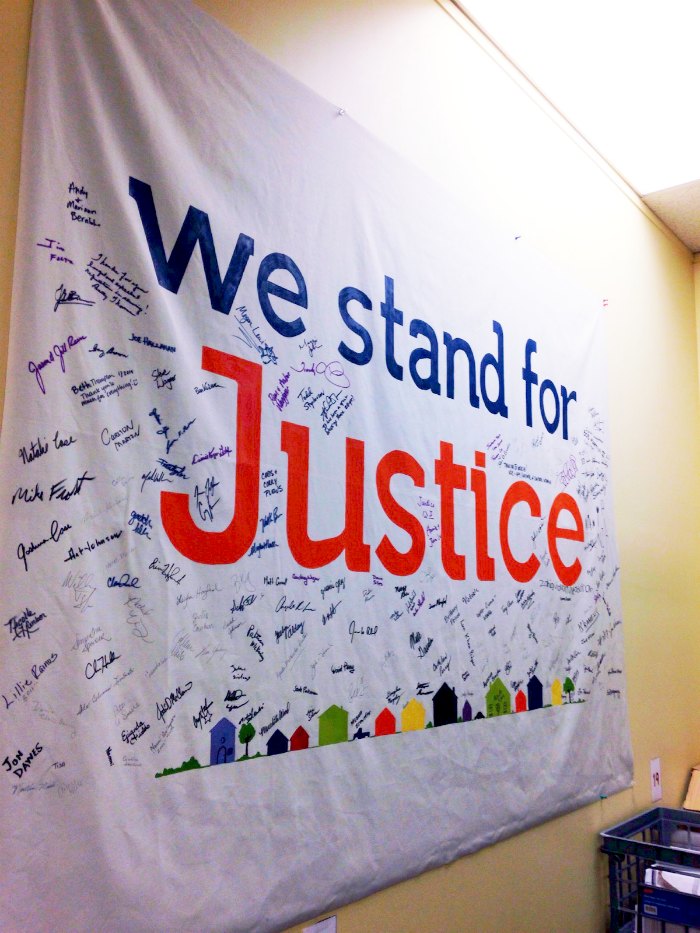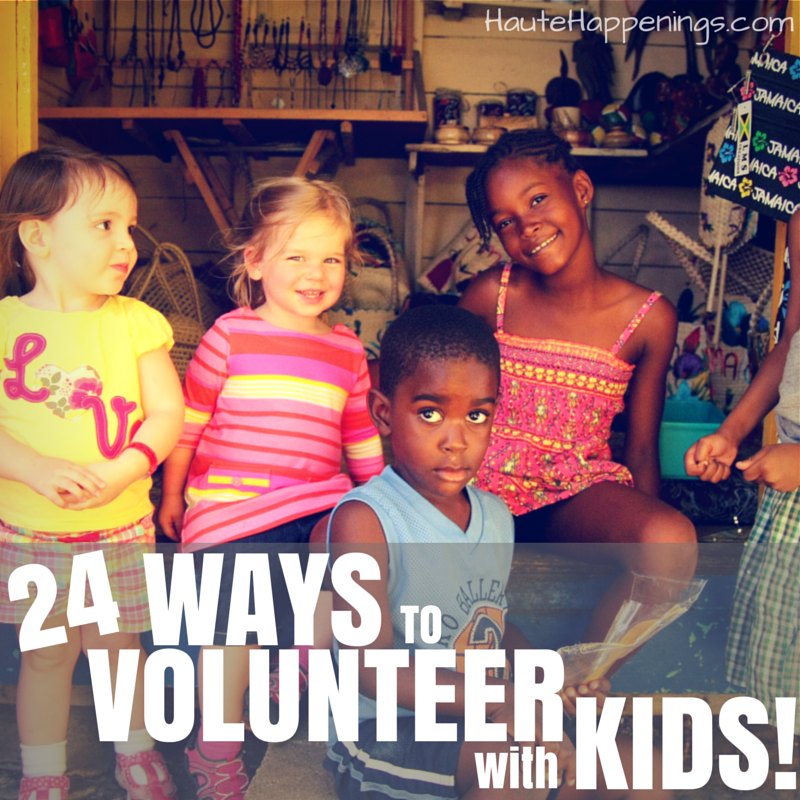5 Ways to Fight Social Injustice as a Family
We joke about our “first world problems,” and I’ll be the first to admit that things like a broken dishwasher and mildly sick kids make me feel like my world is crumbling. However, the hard truth is that most of the people reading this post are rich beyond measure. We are blessed, and we feel grateful.
We also don’t want our kids to grow up feeling entitled, indifferent, or lacking in compassion.
With that in mind, today’s post is dedicated to social justice month, and the Neighborhood Christian Legal Clinic. NCLC is a local non-profit that fights for social justice by providing free/low-cost legal counsel to low-income families. If you would like social justice project ideas for your family, read on for tips from the executive director, Chris Purnell.
I hope you find his writing entertaining and his ideas practical!
5 Things to do with your kids during Social Justice Month
How in the world do you get your kids to understand the presence of injustice in the world? And, how do you get them to think of ways to remedy that injustice?
I am the Executive Director of the Neighborhood Christian Legal Clinic, a Christian nonprofit based out of Indianapolis, IN. Justice is a big deal at the Clinic. Daily, we provide a safe place for low-income people with legal issues to meet with an attorney and be heard—and, hopefully, be represented in their case. We talk about these cases and how our clients are often the victims of injustice: powerful people or systems exerting a suffocating power over them and leaving them unable to flourish.
Justice is about people flourishing and becoming who they were created to be. That includes helping refugees and domestic violence survivors live without fear, eliminating barriers to employment and self-sufficiency, and seeking the welfare of communities that lack material wealth.
This is some heavy whipping cream for your sweet buddy-bear, no? However, because April is Social Justice Month, I wanted to provide five things for you to do with your kids to get social justice on their radar screen.

1) Talk serious, stay cool
This is the low-hanging fruit, right? Wrong. Have you ever tried to talk to your four year old about poverty without sounding like a total downer? Yeah, good luck with that. “Can we play cash register?” “Sure honey. Did you know that there are some people who can’t afford to buy food at all?” “Ummm…let’s play something else then.” You can kiss “cool Dad” status goodbye, my friend.
You can still be breezy and winsome while talking about dead-serious subjects like power and poverty. For example, when you watch Frozen for the 171st time, talk about how Elsa used her power in a selfish way (fortress of solitude) and then for the betterment of the community (cool ice fountains) at the end. Movies and media are a great gateway to thinking about power and poverty. Your kids might get it and they’ll think you’re cool. Rest assured: you are still not.
2) Rock a Gift Catalog
You get them in the mail every Christmas. You thumb through them, smiling vaguely at the sheep and chicks and oxen and seed for sale. You may even muse, “Huh, that’s a fun idea.” But then, into the recycling bin it goes. Don’t do that with the gift catalog this year! In fact, when you get your Heifer International, Samaritan’s Purse, or International Justice Mission catalog, look through it—with your kids. It’ll be a tangible thing for them to hold in their memories and you can show them how to use power (here, money) in a just way. Don’t dismay about timing: these organizations have these available all year round.
3) Stress Empathy
Kids can be rascally, am I right? Your sweet cherub can turn into the reincarnation of Genghis Khan in a tiara and a tutu in a nanosecond. Other than being a disturbing image, it’s a frightening reality. It’s important to get your kids to empathize with others. Empathy is the key to being a just person. If you find it difficult to enter into someone else’s pain, then you might just find social justice perplexing at best.
So, when your kid is being that kid (you know what I’m talking about), pull them aside and talk to them about how the other kids felt when they got their selfish on. On the positive side, provide reinforcement for those moments when your kid says or does something that demonstrates empathy. “Mommy, I was going to bash Caden in the head with my Tonka truck, but then I thought about how that would make him feel—and I hugged him instead.” That’s not only a fantasy-land conversation, but it’s also a demonstration of the right use of power.
4) Get to Work
Someone once told me that justice is “peeling potatoes.” For the metaphorically challenged out there, that means it’s grunt work. It ain’t sexy—unless your spouse is doing it, then it’s totally hot. Show your kids what it means to get their hands grimy for the sake of others. Help at a Habitat for Humanity house if your kids are old enough. Volunteer at a food pantry or a soup kitchen. Clean up a park. Collect some of the old toys and clothes that you don’t use anymore, sell them and give the proceeds to a local organization that you and the kiddos feel passionate about. The key here is to work and to see a result. Peeling potatoes is not memorable work, but at the end the result will be delicious mashed potatoes.
5) Show that YOU Care About Social Justice
Let your kids see you serving and using power wisely. Have them come with you to hang out at the shelter or your church’s food pantry. Explain to them what giving money means and why you do it. Talk to them about why you treat your spouse with gentleness and respect, not angrily and manipulatively.
Caring about justice is better caught than taught. So, during the month of April, help your kiddos catch a glimpse of what a just person looks like. And remember: while this stuff is serious, let the joy of serving shine through. Your kids will dig it! Good luck!

Opportunities Available to Terre Haute Readers
If you’d like to learn more about pursuing justice for central Indiana or how to get involved, visit the Neighborhood Christian Legal Clinic website or donate here.
Additionally, the Clinic provides a monthly intake for people in the Terre Haute area at the Salvation Army. This intake is usually on the last Friday of the month, but be sure to call them to make sure it is that month. People should feel free to come and use the services and get free legal advice on the spot. The clinic’s services include legal representation related to immigration, housing/foreclosure, and bankruptcy.
Struggling families might also be interested in the clinic’s Project PEACE services. Project PEACE provides mediation services in family law cases with civil legal issues such paternity, custody, divorce, parenting time, child support, and grandparent’s visitation.
Also, the clinic would love to have volunteers at the Terre Haute intake site helping with clerical tasks and praying with clients. Contact the Volunteer Coordinator, Jocelyn, at joppenhuis@nclegalclinic.org or Christ Purnell at cpurnell@nclegalclinic.org for more info.
For more service ideas, click on the picture link to see 24 ways to volunteer with kids!




